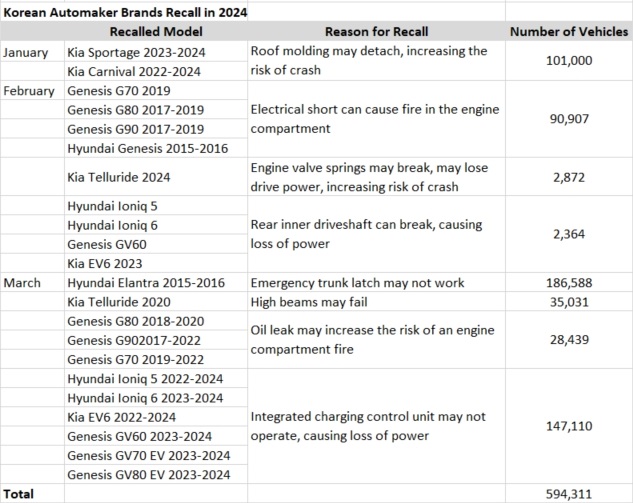Even after ranking fourth in sales last year with the best sales performance ever, Korean brands in the auto market are still raising concerns about quality and safety issues as they continue to be recalled.
According to an analysis of Korean manufacturers’ vehicle recalls reported by various media outlets, 101,000 cars were recalled in January, 96,143 in February, and 397,168 in March (until March 21), for a total of 594,311 cars this year.

For reference, last year, Korean automakers recalled a total of 41 times, totaling 5,738,757 vehicles (including cumulative recalls of the same model), ranking third after Ford and Stellantis. Toyota, which ranked second in sales last year, had only 14 recalls, totaling 2,248,477, making the number of Korean brands recalls 193% higher and the number of affected vehicles 155% higher.
In response, Hyundai Motor Group Chairman Euisun Chung emphasized quality improvement at a New Year’s gathering earlier this year and promoted a veteran vehicle safety expert to the group’s president. Yet, 75% of the recalls were directly related to safety, which can lead to fires, loss of power, and crashes.
On January 21, the National Highway Traffic Safety Administration (NHTSA) announced a recall of 147,110 vehicles, including the Hyundai Ioniq 5 and 6, Kia EV6, and Genesis GV60, GV70EV, and G80EV. The recall is due to damage to the Integrated Charging Control Unit (ICCU) of each EV model, which can cause the 12V battery to stop charging, increasing the risk of a crash due to loss of driving power.
Before this, 28,439 Genesis sedan models, G70, G80, and G90, were recalled on April 14 due to oil leaks that could increase the risk of engine compartment fires, and 90,907 older Genesis and Hyundai models were recalled last month due to a short circuit that could cause an engine compartment fire.
In September last year, owners of 3.37 million vehicles, including 1.64 million Hyundai, 1.73 million Genesis, and 1.73 million Kia, were advised to park their cars outdoors due to the risk of catching fire while driving or parking. The reason given was that brake fluid leakage could cause an electrical short circuit, increasing the risk of an engine compartment fire.
The industry attributes the rising number of safety-related recalls to the increasing complexity of electronic systems and the number of parts as Korean cars become more electrified.
Citing data from the NHTSA, Consumer Reports, a consumer advocacy nonprofit, recently reported that more than 3,100 Hyundai and Kia vehicles have been reported to have caught fire since 2010, killing one and injuring 103 others.
The fires were reportedly caused by a defective connecting rod in certain engines that can damage the engine, causing oil to leak and catch fire. Other causes include defective parts that can cause leaks or electrical shorts in the ABS brake system, faulty circuit boards, and vehicle short circuits due to water leaks.
Michael Brooks of the Center for Auto Safety (CAS) said, “Some of these issues are related to poorly tested software and manufacturing mistakes by component suppliers. This suggests that there is not adequate quality control in the field.”
Experts recommend checking the NHTSA website (nhtsa.gov/recalls) for recalls using the vehicle identification number (VIN), not only for owned vehicles but also when buying used cars.
BY NAKI PARK, HOONSIK WOO [park.naki@koreadaily.com]





